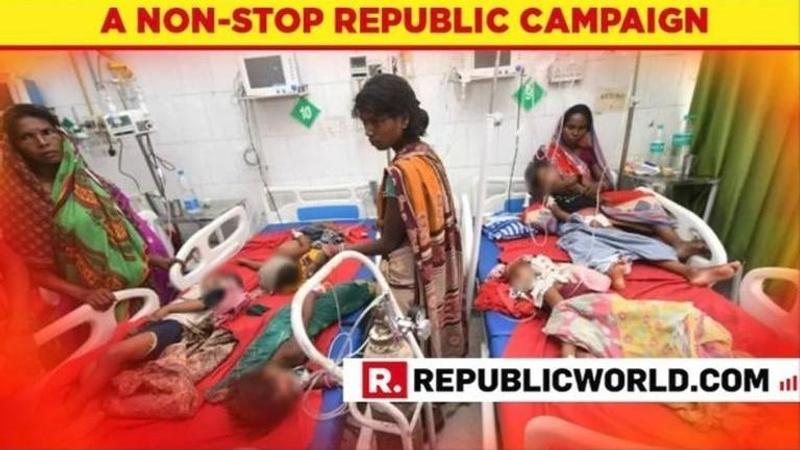Published 15:18 IST, June 23rd 2019
At AES epicentre, experts count reasons, families rue: 'Poverty, malnutrition & lack of awareness'
"We all know poverty and malnourishment are some key reasons behind children's deaths but no one will talk officially as it is a very sensitive matter."

"We all know poverty and malnourishment are some key reasons behind children's deaths but no one will talk officially as it is a very sensitive matter."
A senior doctor at Sri Krishna Medical College and Hospital tries to find reasons as to why Acute Encephalitis Syndrome (AES) has devastated so many families in north Bihar's district of Muzaffarpur in a matter of three weeks -- over 125 children have succumbed to the disease till Saturday.
A visit to two facilities -- government-run SKMCH and the Kejriwal hospital, run by a trust -- that are dealing with most of the AES patients in the district makes it clear the doctor was right in his assessment.
At least 127 children have died till 9 am Saturday -- 107 at SKMCH, 20 at Kejriwal hospital. Most of the patients came from economically poor families, with many being farm labourers or daily wage labourers.
"Majority of the children admitted at the hospital belonged to lower strata on socioeconomic front," said SKMCH Medical Superintendent Dr Sunil Shahi.
But when asked if the deaths were directly linked to "poverty", he refused a clear answer. "My job is to treat patients," he said, "senior government officials can answer (on the poverty aspect)".
The government has maintained the deaths were caused by hypoglycemia, a condition that leads to a very low level of blood sugar and electrolyte imbalance.
On June 22, three died at SKMCH though no casualty was reported from Kejriwal hospital.SKMCH's MS Shahi, however, expressed satisfaction that out of 429 patients admitted in the hospital, 188 have been discharged after treatment.
When this correspondent visited SKMCH on Friday afternoon, the gates of general ward of the paediatric and all the five paediatric ICU, with capacity to treat 50 patients at a time, were shut for mediapersons, probably because frequent visits by journalists might have inconvenienced patients and their attendants.
However, the senior doctor spoke to PTI, requesting anonymity. "We all know poverty and malnourishment are some key reasons behind children's deaths but no one will talk officially as it is a very sensitive matter."
At Kejriwal hospital, the administrator said poverty and hot and humid weather of the town are the two main reasons for these deaths.
"99 per cent of children admitted at Kejriwal hospital since June 1 belonged to families whose socioeconomic condition is very poor...Children went to sleep without having dinner. This, coupled with hot and humid weather, brought their blood sugar level down drastically," hospital's administrator V V Giri told PTI.
"It has been my experience that the disease hits poor families. And I have informed both the district magistrate and civil surgeon that poverty and unusual weather conditions are two main reasons for deaths," said the 88-year-old who has been associated with the hospital for around three decades.
"Malnutrition is the obvious result as poor families don't take healthy diet. Had they been taking healthy diet, children would not have died in such a large numbers," Giri said.
But he asserted "litchi had a very minor role to play in this".
Dr Arun Shah, one of the leading paediatricians of Muzaffarpur and also a member of national executive committee of Indian Academy of Paediatricians, also said litchi is not responsible for the disease.
It has been found in a study that when a malnourished child consumes unripe litchis empty stomach "it can bring down blood sugar level as unripe litchi contains toxins like MCPG and Hypoglycene A", Dr Shah said.
Though, he singled out malnutrition.
Referring to his joint paper published in a medical journal 'current science' in 2016, he said, "Our study confirmed that malnourished children are becoming easy prey to the disease and in particular in the months of May-June. Malnutrition is the biggest reason for children's deaths."
Dr Shah, who has been studying this since 1995, asserted "poverty, hot weather, malnutrition, unhygienic conditions are the main reasons."
A study jointly conducted by the National Centre for Disease Control and Centre for Disease Control, Atlanta, USA, and published in renowned journal 'Lancet' in 2017, listed malnutrition as "the cause of children's deaths", he said, adding lack of awareness is also one of them.
A National Centre for Disease Control staff, who was carrying out a survey at Kejriwal hospital, also said "there seems to be a link with malnourishment".
Majority of the respondents PTI spoke to said they didn't have information on preventive measures. Also, almost all of them complained they did not get anything at Anganwadi centre. The poor hygiene at the hospital didn't help either.
Litter were strewn around the aisle leading to the paediatric's general ward on the ground floor of the SKMCH and the foul stench was difficult to withstand.
"Nothing is available at Anganwadi Kendra, even ORS was not distributed in my village," said 70-year-old Maanmati Devi, a resident of Shitalpatti village, who admitted her grandchild at SKMCH on Monday.
Mohammad Ujale, a farmer at Sutihara village, had come to SKMCH for his niece's treatment. He too had similar Anganwadi centre story to share. He said he didn't come across any advertisement about preventive measures. "Nor did any government agency tell me about it."
However, Akhileshwar Rai of Akhtiarpur Paraiya whose grandchild was being discharged from SKMCH did say he came to know about preventive measures through TV and newspapers.
Updated 15:18 IST, June 23rd 2019




